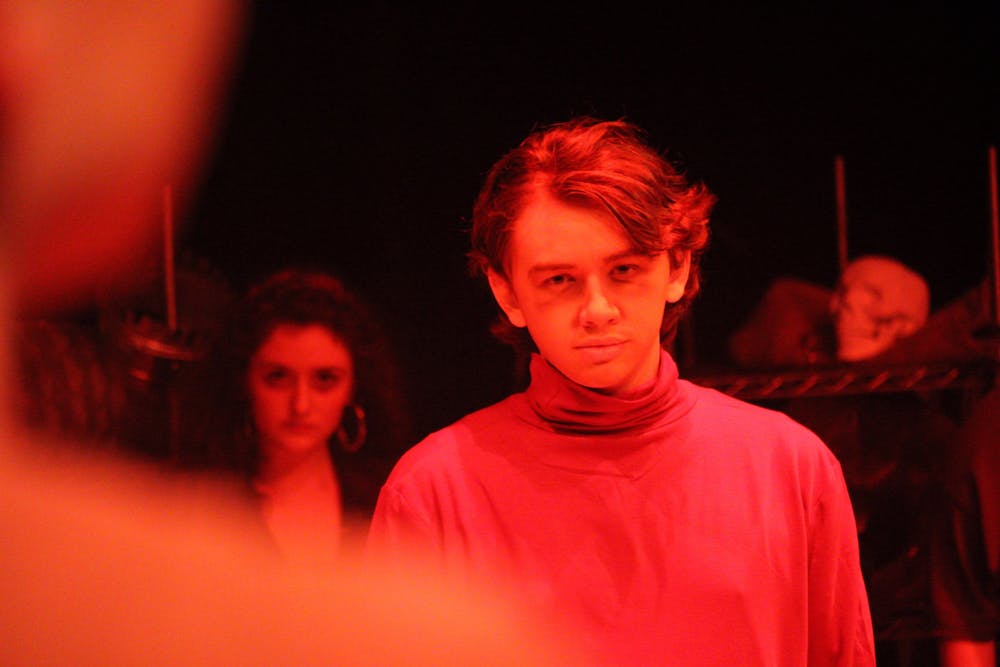By Olivia Harrison
Staff Writer
The original tragic storyline of Shakespeare’s “Macbeth” is well-known worldwide. However, All College Theatre took a different approach in their performance of the classic.
Modernizing the play's setting while keeping the classic Shakespearean rhetoric, ACT introduced audiences to radio show actors taking shelter amidst a war. Although the circumstances are chaotic outside, the actors vowed to continue their radio rendition of “Macbeth.”
The show ran in the Don Evans Black Box Theater in Kendall Hall from Sept. 26 to Sept. 29. It centered around Macbeth, played by junior secondary education and English major Matthew Sudnick, a Scottish general who receives a prophecy from three witches. The witches — played by Sofia Kafarski, a sophomore English major, Mikayla Melton, a sophomore sociology major, and Grace Mandy, a freshman English major — foretell that Macbeth will become the king of Scotland.
After murdering the reigning King Duncan, played by sophomore English major Ella Anzuini, Macbeth is racked with guilt and paranoia.
He forces himself to murder citizens before a civil war takes him and Lady Macbeth, played by Ashlyn Nolan, a junior world languages and linguistics and communication studies double major, to madness and death.
Audiences were taken through two universes: the bomb shelter and the story of Macbeth, portrayed onstage. In addition, the show sent a powerful message that no matter the circumstances, the show must always go on.
“I loved the message of ‘theater needs to keep going,’” said Kafarski. “I feel like it’s important we did a modernized version of the production. There’s a lot of conflict and unrest in the world. It just goes to show you that culture and the arts can continue to flourish through adversity and conflict.”
Combining elements of a severe war and classic Shakespeare dialogue, ACT’s production of “Macbeth” showed off Shakespeare in a fresh light to audiences unfamiliar with the story.
“I didn’t know anything about ‘Macbeth’ at all,” said Katrina Lucero, a junior computer science major. “I think the emotions the actors put into the show was important to portray the story.”
One of the most unique aspects of the production was the actors' ability to follow the play's original diction and rhetoric. Shakespearean dialogue can be complex, and following the original dialogue gave many actors a challenge they had never faced before.
“At first it was difficult to pick up,” said ensemble member Lauren Goldsborough, a sophomore psychology major. “But, as I was listening to my peers, I was able to pick it up. One thing that really helped [was] learning to vocalize in my normal voice, and I was able to interpret the dialogue. With Shakespeare shows, the concept is simple, but the dialogue can sometimes make things complicated.”
Sudnick also said he had a challenging time with the dialogue.
“[The dialogue] is very tough and it was certainly a challenge,” he said. “I’ve never done Shakespeare before. Some of it I did understand, but I had to learn certain words and phrases. Once you understand, it’s just so much easier…it just eventually flows.”
With the complex dialogue and portrayal of a show within a show, the actors and production staff were tasked with putting together the production in just three weeks.
“Our first rehearsal was Aug. 31, and it's only been since then that we’ve got everyone together and put the set together,” said production manager Angelica Froio, a junior computer science major. “It’s been a very awesome experience and I’m so proud of the cast.”
The play was highly condensed, cutting the original production from 2 hours and 30 minutes to an hour and 30 minutes. Nonetheless, the actors still had a great experience performing and challenging themselves.
“Lady Macbeth was my dream role, and getting the chance to play her was amazing,” said Nolan. “Although it only took three weeks to put together, it was such a rewarding experience.”
Actor and junior urban history/secondary education major Caden Michalski agreed, adding, “I haven’t acted in a production since my senior year of high school. I didn’t intend to act in ‘Macbeth,’ I signed up for production staff. However, this show spoke about the artistry of theater…and I couldn’t have done it without everyone.”
Another distinct feature of the production was the intimate staging and the use of stage lighting to portray the setting. The play used three types of stage lighting to portray the bunker: full power, half power and total darkness.
Audiences observed the lighting as it told which part of the story was being portrayed. Full power represented the beginning of ‘Macbeth,’ half power portrayed the paranoia setting in, and total darkness portrayed Macbeth’s descent into death and total insanity.
ACT’s “Macbeth” portrayed the most important message through it all: The show must go on. Tragedy and civil unrest occurred in both the plot of “Macbeth” and the metaphysical radio show, but resilience showed and gave the audience a sense of perseverance within themselves.
“The whole aspect of the show is the spirit of theater and continuing on,” said Froio. “It resonated a lot with our organization and performing ‘Macbeth’ in this mode was a challenge we definitely needed.”
Correction Oct. 2: A previous version of this story incorrectly stated that ACT’s take on Macbeth centered around a zombie apocalypse. This version of the play actually focuses on continuing theatre arts during a war.







